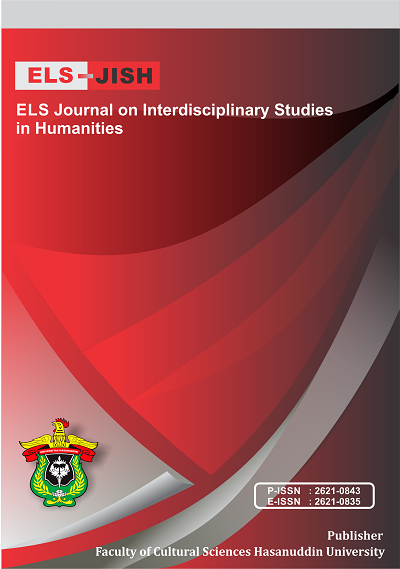The Use of LMS and Talking Stick Method to Improve Reading Skill for ESP Students
DOI:
https://doi.org/10.34050/elsjish.v6i1.24849Keywords:
ESP Students, LMS, Mix Method, Reading, Talking StickAbstract
The Muhammadiyah University of Mamuju has been using LMS since the beginning of the pandemic, called SIMAK UNIMAJU. Learning processed can be accessed with an internet connection via mobile phones, notebooks, or by visiting internet cafes. In face-to-face learning after the pandemic, University lectures of ESP need to rethink student motivation strategies). This study combines the talking stick learning method and SIMAK UNIMAJU LMS technology in teaching reading. The objective of the research are the talking stick combine LMS Simak Unimaju improve the students ability, create students activity in acquiring intellectual skills and attitudes besides motor skills. Mix method design applied by using triangulation by one group pre-test and post-test design. The quantitative data were obtained by students' scores in English reading pre-test and post-test of recount text. Meanwhile, the qualitative data were obtained from classroom observation and interviews. The study was conducted at Class F Management Students in Universitas Muhammadiyah Mamuju, which involved 24 students. The findings showed that the hypothesis testing proved that t count ≥ ttable 14,29 ≥ 1.714. Therefore, the null hypothesis was rejected. It means using LMS and the talking stick method could improve students' ability in English reading comprehension. Another finding also showed that students' responses were positive. They responded that combining LMS and talking sticks is more enjoyable, motivating them to study. Furthermore, it helps them understand recount text and LMS combine talking stick method could be applied as one of the teaching readings to be implemented in the following semester.Downloads
References
Andini, C., Sosrohadi, S., Fairuz, F., Dalyan, M., Rahman, F. F., & Hasnia, H. (2022). The Study of Japanese Women in the Facial Treatment Advertisement: A Semiotics Perspective of Pierce’s Theory. ELS Journal on Interdisciplinary Studies in Humanities, 5(2), 337-347.
Creswell, J. W. (2014). Research design: qualitative, quantitative, and mixed method approaches. Thousand Oaks, CA: SAGE.
Dewi, R. (2015). Model pembelajaran english for spesific purposes dengan pendekatan kompetensi komunikatif berbasis pendidikan karakter. Orbith: Majalah Ilmiah Pengembangan Rekayasa dan Sosial, 11(3),173–181.
Hamidah, F. N., & Yanuarmawan, D. (2019). Penerapan English For Specific Purposes Untuk Meningkatkan Pengajaran Bahasa Inggris Pada Guru Sekolah Menengah Kejuruan. Jurnal ABDINUS: Jurnal Pengabdian Nusantara, 2(2), 236-247.
Hasnia, H., Andini, C., Tahir, M. D., Hunaeni, H., Zulfikariandi, Z., & Muslimin, M. T. (2022). The Ability of 1st Class Students of SMAN 11 Enrekang to Arrange Verbal and Nominal Sentences. ELS Journal on Interdisciplinary Studies in Humanities, 5(3), 539-550.
Irawan, R., & Surjono, H. D. (2018). Pengembangan e-learning berbasis moodle dalam peningkatkan pemahaman lagu pada pembelajaran bahasa inggris. Jurnal Inovasi Teknologi Pendidikan, 5(1), 1-11. doi: 10.21831/jitp.v5i1.10599.
Munir, M. (2010). Penggunaan learning management system (LMS) di perguruan tinggi: studi kasus di Universitas Pendidikan Indonesia. Jurnal Cakrawala Pendidikan, 1(1), 109–119. doi: 10.21831/cp.v1i1.222.
Ni’am, S., Wibawa, H. A., & Endah, S. N. (2014). Pengembangan aplikasi learning management system (LMS) pada Sekolah Menengah Pertama Islam Terpadu (SMP IT) Harapan Bunda Semarang. Journal of Informatics and Technology, 2(1), 11-32. http://ejournal-s1.undip.ac.id/index.php/joint, 12(2), pp. 123–132. Available at: http://ejournal-s1.undip.ac.id/index.php/joint.
Ninda, S., Putri, A. and Taufan, J. (2021) Permasalahan Dalam Pembelajaran Selama Pandemi Covid-19 Bagi Anak Berkebutuhan Khusus. Jurnal Penelitian Pendidikan Khusus, 9(2), 41–45. Available at: http://ejournal.unp.ac.id/index.php/jupekhu/article/view/112223.
Polit, D.F & Hungler, B.P. (1999). Nursing Research: Principles and Methods. 6 th Edition. Philadelphia: Lippincott.
Prihandoko, L. A., Al Ahmad, A. S. M., & Rahman, F. (2022). Revitalizing Hospitality, Managerial, and English for Tourism Purposes Skills: Community Partnership Program for Hotel Employees in Merauke Regency. ABDIMAS: Jurnal Pengabdian Masyarakat, 5(2), 2524-2531.
Prihandoko, L. A., Al Ahmad, A. S. M., Fredy, F., & Rahman, F. (2022). Multi-Regression Analysis of Factors Influencing Perceived Academic Writing Competence (PAWC) of Vocational School Students. OKARA: Jurnal Bahasa dan Sastra, 16(2), 329-348.
Rahayu, A. B., & Widiansyah, A. T. (2019). PENGEMBANGAN BAHAN AJAR ESP-READING COMPREHENSION BERBASIS AUDIO VIDEO UNTUK SISWA SEKOLAH MENENGAH KEJURUAN TEKNIK OTOMOTIF. Dharma Pendidikan, 14(2), 12-26.
Rahman, F., & Weda, S. (2019). Linguistic deviation and the rhetoric figures in Shakespeare’s selected plays. XLinguage" European Scientific Language Journal", 12(1), 37-52.
Rahman, F., Abbas, A., Hasyim, M., Rahman, F., Abbas, A., & Hasyim, M. (2019). Facebook Group as Media of Learning Writing in ESP Context: A Case Study at Hasanuddin University. Asian EFL Journal Research Articles, 26(6.1), 153-167.
Syamsia, S., & Rusdy, N. (2021). The Effectiveness of Cooperative Learning Method Type Talking Stick in Improving Vocabulary Memorization of the VIII class Students of MTs Al-Kautsar Kao. Langua: Journal of Linguistics, Literature, and Language Education, 4(2), 18-27, pp. 18–27. Available at: http://jurnal.stkipkieraha.ac.id/index.php/langua/article/view/211.
Triana, N. (2021). Penerapan Talking Stick Untuk Meningkatkan Hasil Belajar Bahasa Inggris Siswa: SMA Negeri 1 Singosari Malang. Mitra Pendidikan, 2(2), 51-59.
Wantu, W. (2018). Penerapan Metode Talking Stick dalam Meningkatkan Pemahaman Materi Teks Recount Pada Pembelajaran Bahasa Inggris. Al-Minhaj: Jurnal Pendidikan Islam, 1(1), 113-128.
Yamin, M. (2017). Metode pembelajaran bahasa inggris di tingkat dasar. Jurnal Pesona Dasar, 1(5), 82-97.
Downloads
Published
How to Cite
Issue
Section
License
Copyright (c) 2023 Kurnia, Sianna, Hamzar, Muh Ferils, Furqan

This work is licensed under a Creative Commons Attribution-ShareAlike 4.0 International License.

















